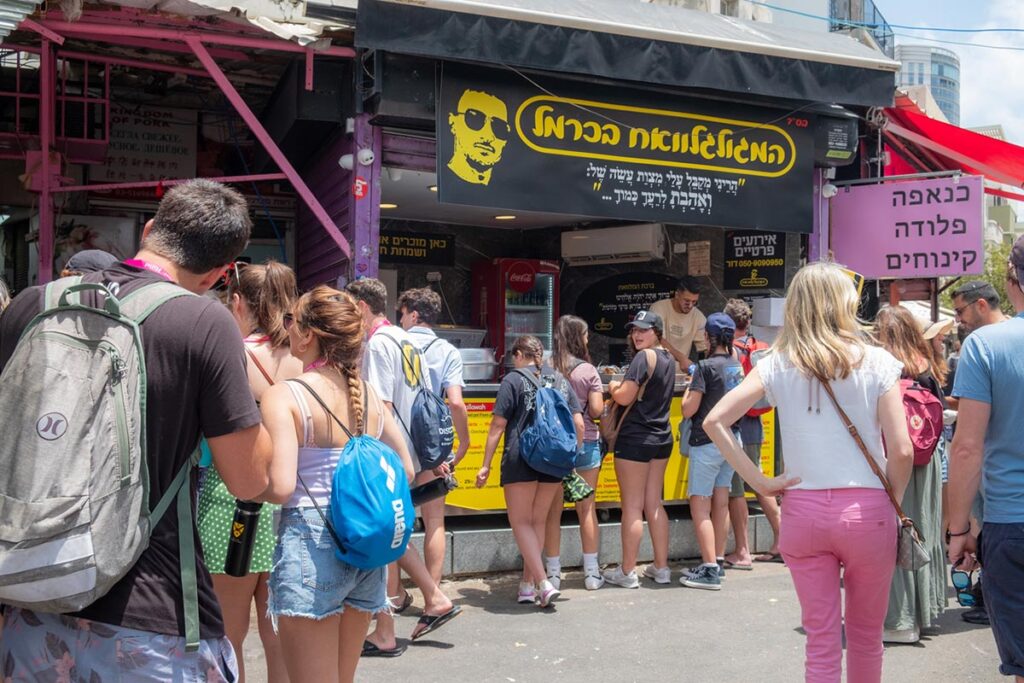
Hebrew is a language unlike any other. From being the spoken language of the ancient Jewish kingdoms over 3,000 years ago to being revived as the first language of millions of people in Israel and beyond, it has truly withstood the test of time.
These 18 essential Hebrew words and expressions will have you sounding like a true sabra (native-born Israeli) in no time!
While this list is not comprehensive, you will undoubtedly be prepared to stroll through the streets of Israel and impress the locals with more than just “shalom” at your disposal. Let’s dive in — yalla balagan!
We’ll start with the basics…
Sababa – סבבה
One of the most common Hebrew expressions, “sababa” has a connotation of “great,” “cool,” or “awesome.” It’s hard to even go one day in Israel without hearing this ubiquitous word, which is originally Arabic for “longing,” “love,” or “desire.”
Achi / Achoti – אחי / אחותי
Literally meaning “my brother,” achi is your go-to Hebrew word for “dude” or “bro” when referring to your closest guy friends. For your girl-friends, use achoti, which has a direct translation as “my sister.”
What’s unique about “achi” and “achoti” is that they are not only reserved for close friends, but can be used with everyone, one of the unique features of Israeli society.
Yalla – יאללה
If you’ve listened to even one episode of “Unpacking Israeli History,” then you know the phrase, “Yalla, let’s do this!” Yalla is another quintessential Hebrew slang word, meaning “c’mon,” “hurry up,” or “let’s go.”
You’ll also hear Israelis say this as they hang up the phone, as in, “yalla, bye!” It’s originally Arabic, translating directly to, “oh God.”
Balagan – בלאגן
Balagan is a versatile word describing a “mess” or something that is downright crazy. Skirmishes in Jerusalem on a controversial holiday? Balagan. Getting lost in the confusing corridors of Tel Aviv’s Tel Aviv’s Central Bus Station? A total balagan.
But, it can also be used in a positive sense to describe anything wild, even a fun party. Balagan comes from the Russian word for “farce” or “tomfoolery.”
Achla – אחלה
Simple and to the point, achla refers to all things great, awesome, or the best. Whether it’s a good movie, a delicious meal, or even a stylish shirt, you can describe it with achla. For example, “achla yom – אחלה יום” translates to an awesome day.
Want more? Check out these 18 essential Yiddish words and sayings
Dai – די
This versatile word has a couple of different meanings. It can mean “cut it out” when someone’s bugging you, but it can also be used to express shock or disbelief. For example, your friend says, “I’ve just booked my flight to Tel Aviv!” You reply: “די – Dai!” (“No way!”)
Ashkara – אשכרה
The perfect word for those who literally can’t stop saying “literally,” ashkara is the Hebrew equivalent for this oft-mentioned filler word.
Stam – סתם
While “stam” may not have a direct English translation, its closest equivalents are “no reason” or “just because.”
This adaptable word can also be added to the end of a sarcastic statement, signaling that you’re just joking. For example: “7-Eleven is opening in Tel Aviv? Pretty soon, they’ll outnumber Aroma… Stam.”
For the next few phrases, you won’t want to trust Google Translate…
Chaval al haz’man – חבל על הזמן
This expression literally means “pity/shame on the time,” but it actually describes the opposite — something fantastic or great. For example, you could say: “Ha’seret haya chaval al haz’man!” (“The movie was fantastic!”) You might also hear it shortened to its abbreviated form, “chavlaz.”
Al hapanim – על הפנים
Google Translate will tell you that this phrase means “on the face,” which is technically correct. However, it is also used as an expression to mean “terrible” or “lousy.” For instance: “Ha’ochel sham al hapanim!” (“The food there is terrible!”)
Chai b’seret – חי בסרט
The translation of this fun phrase is “living in a movie,” and its meaning is not much different. It describes someone who’s living in a dream world, disconnected from reality. In other words, just plain unrealistic.

Ma pitom – מה פתאום
While it literally means something along the lines of “what suddenly,” “ma pitom” is best translated in English as “no way!” It is almost always used as a response and reaction to something unexpected, as in: “No way! Are you serious?”
Choleh al / Met al – חולה על / מת על
These words literally mean “sick over” or “dying over.” They have a similar connotation to “crazy about” in English. Use them whenever talking about something or someone that you like so much, it just drives you crazy.
Ochel seratim – אוכל סרטים
The literal translation of this phrase, “eating movies,” may not make sense at first. But, it describes a feeling many of us are familiar with: worrying about the future so much that you’re making up “movie scenes” in your head about how it might end in disaster.
For example: “Ha’horim sipru li she’anachnu ovrim l’kanada, ani ochel seratim!” (“My parents told me that we are moving to Canada, I’m starting to get really nervous!”)
Ma ani, ez? – ?מה אני, עז
While asking “what am I, a goat?” might at first sound like complete nonsense, it serves as the Israeli equivalent for the English expression, “what am I, chopped liver?” In other words, you can use this phrase when you’re not receiving the attention or recognition you rightfully deserve.

These next few words are some of my favorites in the language. Saving the best for last…
Esh – אש
Literally meaning “fire,” “esh” is perfect for responding to anything that’s seriously cool. For example: “Atah tas machar l’yapan? Esh!” (“You’re flying to Japan tomorrow? Awesome!”)
Pitzutz – פיצוץ
The Hebrew word for “explosion, “pitzutz,” is also a slang word describing something awesome and cool, as in “the bomb.”
Anak / gadol – ענק / גדול
With “gadol” meaning “big” and “anak” meaning “huge,” it’s no wonder that both these words can also describe something great, wonderful, or awesome.
For instance: “Lamadta ledaber ivrit levad? Gadol!” (“You learned to speak Hebrew by yourself? Cool!”) “Atah mevaleh et kol ha’yom ba’yam? Anak!” (You’re spending the whole day at the beach? Awesome!”)
Originally Published Jun 4, 2023 04:17PM EDT
